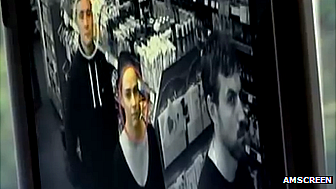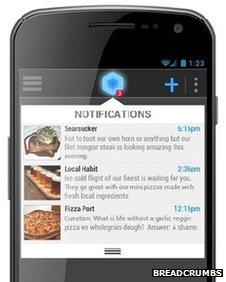Targeted real-life adverts 'know who you are'
- Published
Adverts 'know who you are'
Targeted adverts - based on web browsing history - have become established online, but how will the public react as advertisers start to pinpoint our habits and interests in our offline life too?
Imagine walking into a shopping centre and the video screens nearby bring up footage from the newly-released box set of your favourite TV series.
As you approach a shoe store your mobile flashes a special offer for a pair of the trainers with the same brand as the ones you're about to wear out.
Then, as you walk into a coffee shop, the displays refresh to promote the giant-sized version of your favourite iced drink.
Whether you find the ideas captivating or creepy, they could soon be commonplace.
Facial recognition cameras are already being fitted to billboard screens so that advertising companies can monitor the sort of people viewing adverts at each location.

Cameras using facial recognition can recognise the sort of people looking at the advertising screen
"It manages to recognise them through a number of traits," says Mike Hemmings, marketing director of Amscreen, one of the firms offering the tech.
"These traits can be things that characterise a male or a female or a person of a certain age. For instance if you are a male, it will pick up the cheekbone structure.
"It correlates it all together and then tells the advertiser and us how many people and what types of people are seeing the advert at any given time and at any given place."
The company, which is part of Lord Alan Sugar's Amshold empire. claims more than 50 million people globally see its screens each week.
In the UK, that amounts to around 3,500 screens in places like doctors' waiting rooms, railway stations, airports, petrol stations.
"Next is serving adverts in real time to people as they're standing in a queue," adds Simon Sugar, Amscreen's chief executive.
"It will also enable [subscribers] to go online to our portal to change adverts and to change them in real time, which is quite key. What we are trying to do to is replicate what's happening online in an offline world."
'Face detection'
Facial recognition is not the only idea about how to bring online personalisation into the real world.
Students at the European Institute of Technology are working on a system to link Facebook accounts to RFID (radio frequency identification) chips embedded into store loyalty cards.

RFID tags in Burberry clothes bring up related videos on screens in its London flagship store
The idea is that these chips could be used to flash up personalised adverts and special offers on screens when consumers visit the shops.
The team behind the Rigene project, external suggest when the stores are busy their software would study the the customers' various tastes and choose the ads most likely to appeal to the majority of those present.
Fashion brand Burberry is already using RFID tags in a more limited way by embedding the tech into its latest collections.
When customers wearing the clothes stand in front of "magic mirrors" in its London flagship store the screens start showing footage of how the products looked on the catwalk when modelled with other Burberry goods.
For now the firm says its system can only recognise its products and not the people wearing them.
But it adds, external: "It is possible that in the future we may link the RFID tags to our customer database."
It's not hard to imagine the technology being used one day to recognise the return of big spending customers and adjusting displays to suit them.
App ads
Computer chip developer Qualcomm is taking another approach.
Its Gimbal Proximity system, external is designed to trigger ad notifications within apps on Android and iPhone handsets when they are carried close to a shop or other organisation paying to use the technology.
It gathers data from a handset's sensors and combines it with the owner's web browsing history, app use and other saved data to build up a profile of them.
Based on their interests, its best guess at their current activity and the time of day, their handset then picks which ads to show them without needing to reveal their private data to the firms running the campaigns.

Gimbal lets apps show location-based ads based on a user's interests
Japan was the first to roll out the tech. Qualcomm said trials suggested users were three times more likely to click on the notifications than normal non-contextualised ads.
Privacy limits
As retailers trial such tech they are well aware there is a risk of a privacy backlash.
Clothes store Nordstrom recently cancelled a scheme which tracked customers' movements through its stores using their phones' wi-fi signals after complaints.
Campaigners warn there must be limits.
"Part of the bargain with the public is that surveillance is necessary to keep us safe," says Nick Pickles, director of Big Brother Watch.
"Now we are seeing that surveillance that is being installed in shops and in streets that was for public safety purposes is being used for advertising.
"Are we willing to accept our everyday movements being monitored and analysed, not to keep us safe but purely to allow advertisers to target us? I think people will start to say no, our privacy is worth more than a few advertising dollars."
- Published18 April 2013
- Published13 June 2013
- Published30 August 2012
- Published23 April 2013